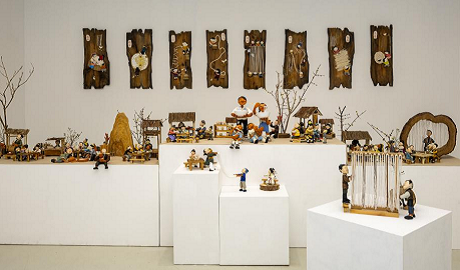

Photos of the lander (left) and the Yutu 2 rover from the Chang'e 4 robotic mission on the surface of the moon, taken by each other. [Photo provided to China Daily]
Busy days
On a typical day shift in the space station operations team, the controllers start work by contacting and communicating with the astronauts inside Tiangong. A designated controller talks with the crew members about the arrangements for the day and notes their needs.
Meanwhile, those in charge of the tracking apparatus relay the daily tasks to tracking stations and ships, and ensure that they are able to do their jobs. The controllers also need to amend arrangements for tracking stations and ships and relay satellites whenever any of the assets are not functioning properly, Hu said.
"Some controllers are responsible for uploading commands. They prepare orders for the spacecraft based on what the mission planners want the vehicles to do, then send the signals to the spaceship in accordance with predetermined schedules," he said. "For instance, when the astronauts want to sleep, we will upload an order to the station's alarm system to shut down the voice alarms."
The chief controller said that there are many unpredictable factors when it comes to operating large orbiting infrastructure such as a space station in near-Earth space, which is already crammed with satellites and debris.
"It is not unusual that we have to move our space station higher or lower than its normal altitude to avoid incoming hazardous debris — and that is never easy," he said.
"Adjusting a spacecraft's position is not as simple as just typing some codes and sending them out, as some people may imagine. It requires systemic considerations: you must decide which tracking station or ship will upload the commands and monitor the spacecraft during the process; you need to pick another station or ship as backup; you also need to take a host of factors into account, including the orbital adjustment's impact on the space station's condition, like its power generation and the operation of internal equipment."
He added that the controllers must have clear, sharp minds and be quick and decisive to figure out solutions to potential risks.
"Not long ago, an alarm warned that the barometric pressure inside the Tiangong station was falling rapidly: if that were really happening, the situation would be highly dangerous for our mission crew. So, we immediately collected and analyzed all the readings and concluded that it was a false alarm caused by minor sensor errors," he said.

Wuyi rock pigment painting in China's Fujian infuses modern artistic elements into tradition

China-Serbia digital art exhibition explores time, space, heritage


Exhibition of children's arts opens in southwest China's Chongqing

World's largest ice and snow theme park opens, igniting China's winter tourism fever
点击右上角![]() 微信好友
微信好友
 朋友圈
朋友圈

请使用浏览器分享功能进行分享
